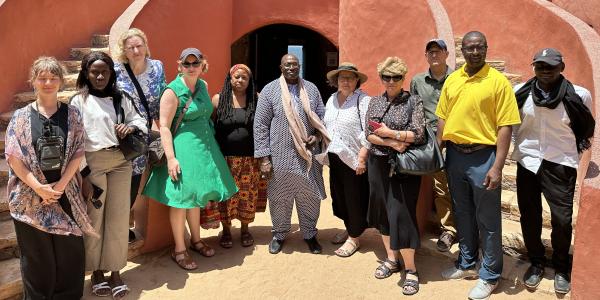
Senegal is known to many as the gateway to the African continent—a title that has certainly proved true to Pitt’s Center for African Studies (CAS).
CAS started summer 2023 by sending a multi-disciplinary team on a journey to meet with potential collaborators, participate in cultural activities, and witness the many cultures and flavors of Senegal firsthand. Tiffany Gary-Webb (Public Health), Elaine Linn (Global Studies), Todd Reeser (French and Italian), Pernille Roge (History), Oronde Sharif (Africana Studies), and Kornelia Tancheva (Libraries) joined CAS director Catherine Koverola and academic advisor Anna-Maria Karnes on the week-long trip, the first time a group like this has traveled to Africa at Pitt. The cohort had plenty of time to brainstorm ways that faculty, staff, and students can connect across disciplines for unique and meaningful Senegal experiences.
“This was truly an incredible interdisciplinary team that brought such different perspectives to our shared journey.” Koverola said, “We hadn't traveled together before, and yet we gelled in a way that was just so beautiful, there was synergy and a sense of shared purpose from the start.”
One priority was, of course, making time to meet with partners at Université Cheikh Anta Diop (UCAD), the West African Research Center (WARC), Université Gaston Berger (UGB), and the Group of Action and Critical Study – Africa (GAEC – Africa) in Dakar and St. Louis. UCAD, WARC, UGB, and GAEC – Africa are all forward-thinking and research-focused, making them ideal collaborators for Pitt. In particular, African partners are focused on the diaspora, Black history and futures, and establishing pathways for the equal exchange of ideas.
The Pitt delegation attended group meetings, then split up so members could have time to connect with their Senegalese counterparts and brainstorm ways to work together and create opportunities for their faculty and students.
Professor in the Department Epidemiology and Associate Dean for Diversity, Equity, and Inclusion at the University of Pittsburgh School of Public Health Tiffany Gary-Webb, who had been to the Continent with African American groups several times previously, said, “Having this group and traveling professionally was very different for me, but it was also wonderful because of the openness that everyone had. I don't normally see a lot of my colleagues with that level of open-mindedness and respect and interest in what's going on in the continent and with Black people, period. So, I was really happy about that. We talked about politics and the more intellectual side of the continent and decolonialism, and that was really a highlight for me to understand those things. Normally, when I'm traveling, I'm on vacation, and we're, you know, we're doing fun things. We're in museums and markets, but we're not necessarily learning about politics.”
Team members also had plenty of time to experience Senegalese culture outside of academia. In Dakar, they visited the Museum of Black Civilization and toured Gorée Island, a UNESCO World Heritage site that encourages dialogue about the history and legacy of the African slave trade. Both sites focused on the history and contemporary happenings both on the continent and throughout the diaspora. The Museum of Black Civilization even highlighted important figures of the diaspora like Barack Obama and George Floyd.
Professor and Chair of French and Italian Todd Reeser said, “Dakar and Senegal will really be ideal places for students to grow through study abroad and local engagement with the people who live there. I think we were all struck by the warmth of the people. Senegal’s rich cultural production offers innumerable opportunities for student exploration: artistic production, the way museums are set up and tell their stories, architecture, mosques, music, and—also very important for me—food. I think students would be really interested in Senegalese cuisine. I’m also convinced that students who visit Senegal will learn a lot about not just how the French language functions outside of Western Europe, but also how folks relate to speaking multiple languages in their daily lives.”
Everyone also had the chance to visit a market in Dakar and learn traditional dances on the beach before returning stateside. Africana Studies Teaching Professor and Director of Undergraduate Studies Oronde Sharif said, “One of the greatest things is all the opportunity and openness that study abroad and Senegal can present to students and faculty. I think one of the best moments for me was watching everybody navigate the market on the last day. I think openness is probably the key word to everything—openness to the country, the people, the culture, and as a team, being open to each other and allowing everyone to be themselves.”
This journey marked a next step in the Pitt Embraces Africa initiative, an extension of the Global Plan for Pitt that seeks to forge partnerships to advance research in Francophone West Africa, engage in development of scholarship and tools that deconstruct systemic racism, and build new systems supportive of equity and inclusion.
A huge focus of the initiative is creating mutually beneficial partnerships with universities, institutions, and individuals in Africa to further collaborative goals and learn from each other. As Hillman University Librarian and Director of the University Library System Kornelia Tancheva said, “We are embracing Africa, but Africa is also embracing us as an equal partner”.
While the Pitt Embraces Africa initiative continues to solidify and expand, faculty and students are encouraged to consider Senegal as the next step in their global journeys. Those interested in being a part of the initiative and learning more about future opportunities from CAS should reach out to africast@pitt.edu.

